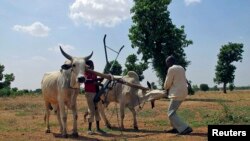Bloody battles between farmers and nomadic herdsmen, which claim lives and cost millions of dollars, are a long-running problem in Nigeria’s countryside.
The states that make up Nigeria’s north-central middle belt are home to great swaths of arable land that could be key to the agricultural revolution that Nigeria’s recently inaugurated President Muhammadu Buhari says he wants to achieve.
But the region is often the sight of violent clashes between farmers and herdsmen over who gets to use the land, and how.
Farmers complain that nomadic cattle destroy their crops. Herdsmen, who are predominantly of the Fulani ethnicity, say they have nowhere to graze their cattle. Both groups agree the conflict is needlessly costing money — and lives.
Middle Belt violence
Daniel Zakariya Jamo, the chairman of an association of cassava farmers in Kaduna state, said, “One problem leads to another. By then, there’s a little conflict, the Fulani will run away, the farmers will not farm. The farmer is afraid to go and farm, and the Fulani man has run away.
"So when the Fulani man is not grazing, the cattle are not well fed, the farmer is afraid to go to the farm, of course there is going to be reduction in production.”
Local media regularly carry reports of carnage in the Middle Belt. In March, 80 people were killed in Benue state. Seven died in Taraba state in April. Another attack in Benue claimed 96 lives in May. Most of these attacks are blamed on herdsmen.
But Saleh Mumale, acting director of Pastoral Resolve, a non-government organization trying to resolve the conflicts between the two groups, said the reality is far more complicated. Poor demarcation of farming and grazing land leads to cattle trampling on crops.
Also, the conflict is worsened by religious and ethnic tensions and meddling by politicians, said Mumale. “People view issues from narrow religious or ethnic or political perspectives, they try to isolate sections of communities from the issue of governance, from the issue of development, and then they try to favor one group against the other.”
Key demarcations, nominations
Buhari came into office promising to tackle Nigeria’s myriad security issues, and to wean the country’s economy off of its dependence on oil production revenues. Solving the crisis in the Middle Belt could be key to building up Nigeria’s underperforming agriculture sector.
Alhaji Mohammadu Dodo Oroji, a Fulani leader, said developing agriculture will require properly demarcating grazing paths and reserves from farmland.
“From state to state, they have routes, and then they have grazing reserve. If the government, the federal government, will review the grazing reserve and then the route, believe me, nothing will make the Fulani and the farmer to get [into] any clash,” said Oroji.
Perhaps the first indication of President Buhari’s thinking on this issue will be his nominations for cabinet ministers in the coming weeks.




